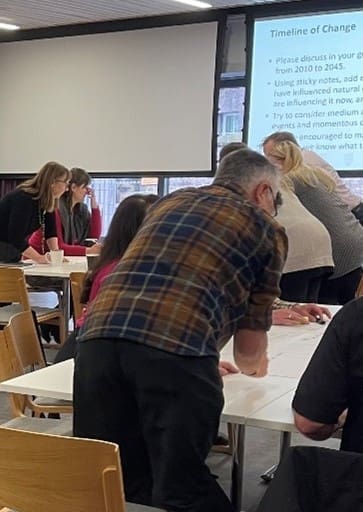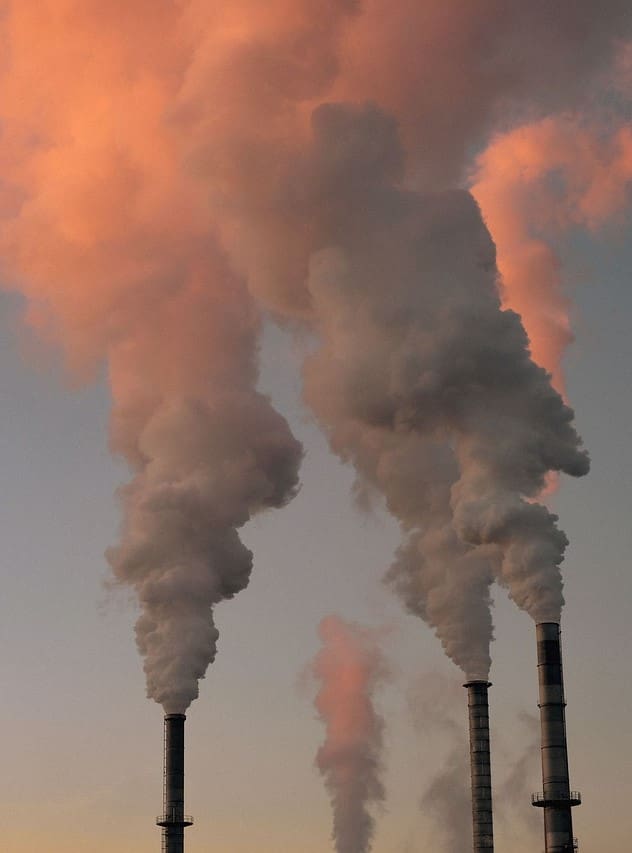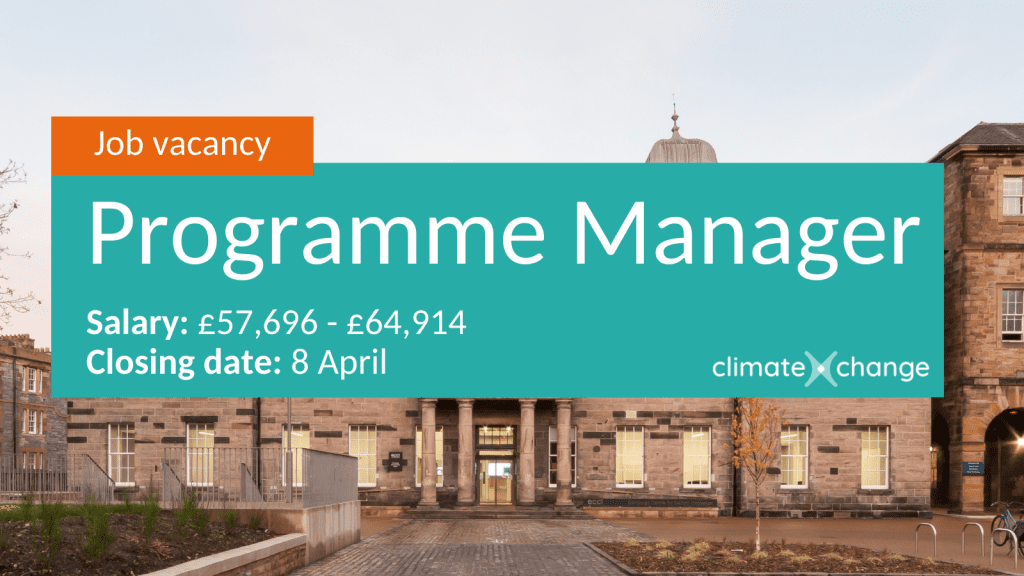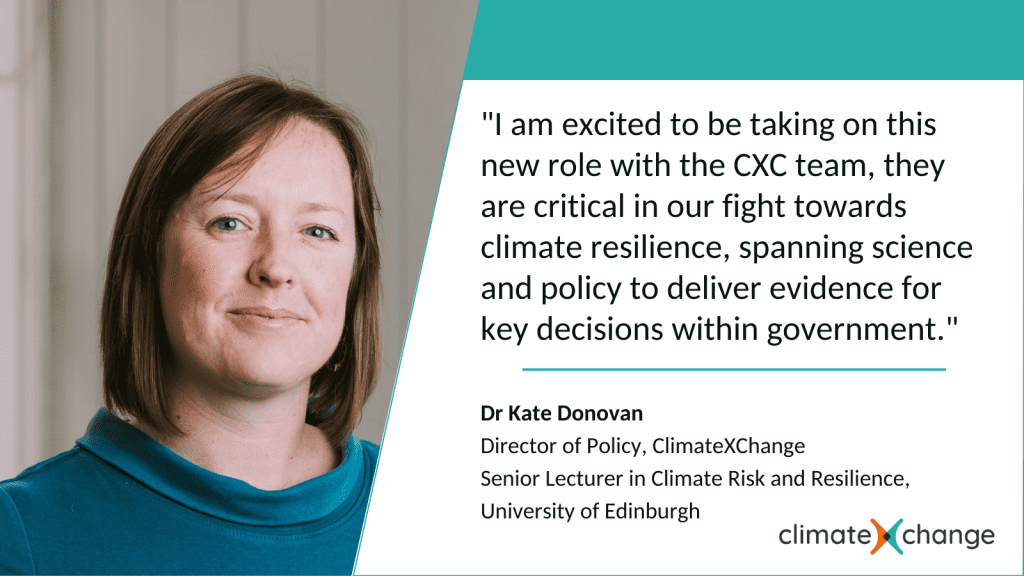Sorry, We could not find the page you are looking for.
When the value of nature is discussed, a lot of attention is given to its economic aspects. The current trend of considering nature as ‘natural capital’, therefore, perhaps lends itself to an economic way of thinking. But what if we considered a more diverse range of values associated with nature? Could this provide a truer and more inclusive picture of nature’s value, and could this encourage fairer and more sustainable management of people’s relationships with it?
Aiming to explore this, in January 2024, my colleagues and I from the James Hutton Institute hosted a workshop about natural capital with ClimateXChange. This was conducted as part of two projects on natural capital: ‘Bringing in participatory approaches to widen the scope of natural capital valuation’, and ‘Climate change impacts on natural capital’, which are funded by the Scottish Government’s Strategic Research Programme. This workshop also followed on from an online expert consultation on values for natural capital, held in May 2023. Our aim was to explore the range of values for natural capital in Scotland, beyond just the economic aspects, as well as what could affect changes in these values in the future.
Methodology
We invited representatives from the Scottish Government, who work in the research-for-policy interface, from community development organisations, from environmental organisations, from agriculture and land management, and from forestry organisations, as well as academic researchers, to join the conversation.
We used a ‘scenario planning’ approach to explore values for natural capital and how these could change in the future. Scenario planning involves imagining and analysing a set of scenarios that describe plausible future conditions of a particular subject (in this case natural capital in Scotland), through discussion in groups. As part of this, we split participants into three discussion groups and first asked them to reflect on what has influenced the development of natural capital, values for nature and natural capital management since 2010, and think about what might plausibly influence this in the future, up to 2045 – the Scottish Government’s target for meeting net zero.
We then asked participants to consider in more depth the drivers of change – the kinds of trends, patterns and events that could influence changes in natural capital, values for nature and natural capital management. We asked them to consider drivers of change across the categories of social, technological, environmental, economic and policy aspects.

Finally, we asked participants to select social, technological, environmental, economic and policy drivers and make assumptions about how they could develop in the future. We asked participants to reflect on whether those drivers are likely to bring positive or negative change, or if they might maintain business as usual.
Community values and natural capital
The discussion in all of the groups, but especially in my group, had a strong focus on community values associated with connectedness with place. This idea was built on an assumption that people’s connection with place is inherently tied up with the nonhuman landscape and ecosystem around them.
In a positive scenario, people who are more connected to nature and the rural landscape would be empowered through local governance and stronger local economies. Interestingly, there was an assumption that if people are more connected to nature in their local landscapes, they would manage it in a more caring manner and improve the condition of natural capital.
Participants thus perceived a cyclic relationship between community values and the condition of nature. Participants assumed that stronger community values associated with local communities’ connectedness with local place would lead to more compassionate relationships with nature in those places, including greater emphasis on its intrinsic value. They assumed people’s compassionate relationships and subsequent desire to keep ecosystems healthy would increase the resilience and condition of the ecosystem around them, which would in turn enhance people’s interactions and relationships with nature.
Natural capital valuation
Although there are other perspectives out there, I think the fact that values associated with community, connectedness to place and people’s relationships with local landscapes, came up so strongly in this conversation, emphasises the importance of other-than-economic values receiving more attention in natural capital valuation.
A learning point for me was the importance of considering people and their connections with nature as interwoven with natural capital, rather than taking an anthropocentric view of humans as separate from nature.
This learning will inform future aspects of the work on both of these projects, especially the development and application of participatory valuation approaches in a case study as part of ‘Bringing in participatory approaches to widen the scope of natural capital valuation’, and also assessment of how future risks and opportunities could affect the diverse values of natural capital in ‘Climate change impacts on natural capital’.
Related links
Bringing in participatory approaches to widen the scope of natural capital valuation
Climate change impacts on natural capital
ClimateXChange (CXC) seeks to offer a one-year postdoc research role to aid the Scottish Government in creating a comprehensive plan for enhancing soil health across Scotland.
The researcher will work with policy leads from the Scottish Government to design a routemap for the key actions that enable soils that “are healthy and provide essential ecosystem services for nature, people and our economy”, as identified in the consultation draft of the Scottish National Adaptation Plan 3.
The research will build on the results of a stakeholder workshop in spring 2024, which will confirm the strategic priorities for action through the routemap.
Stakeholders will include, but not be limited to, Scottish Government policy teams, their agencies and non-governmental organisations with an interest in soil management.
Scotland’s soils are our greatest natural asset and underpin much of our social and economic activity. The health of our soils is dramatically impacted by climate change and land use. That is why this work on bridging the science and policy gap on soils is so important. Our goal is to ensure that soil health is an integral part of our national efforts to adapt to climate change and sustain our wellbeing.
Prof. Mathew Williams, Chief Scientific Adviser, Environment, Natural Resources and Agriculture, Scottish Government
Challenge
The action plan resulting from this project will be complex, cross-sectoral and transdisciplinary.
Soil health is a cross-cutting issue, with policy interests across government, including agriculture, forestry, land use, energy, development, food production, biodiversity, economy and public health.
Important topic
Scottish soils are at the heart of all life and underpin social and economic activity. However, exacerbated by climate change, soils are at high risk of damage through compaction, erosion, flooding, drought and loss of organic matter.
These changes have local, regional and national impacts, which can be difficult and costly to reverse.
Benefits of working with CXC
CXC postdoctoral research opportunities enable researchers to build long-term relationships with policymakers and to develop communications and engagement expertise.
ClimateXChange provides training and development into the policy process and effective research communication to policymakers. Former CXC postdocs found the opportunity a great boost to their work, as they moved on to careers in academia and across policy and government analytical services. One of them said:
It allowed me the space to grow in terms of my methodological capabilities, research ambition and research impact.
Former CXC postdoc
We are delighted to be starting this research project soon. It is a great opportunity for postdoctoral researchers to conduct a study that will inform policymaking, ensuring that Scotland’s soils are resilient in the face of climate change.
Dr Sarah Govan, Project Manager, ClimateXChange
Related links
Invitations to quote: Information about this opportunity
Building connections, confidence and skills: The benefits of a ClimateXChange Fellowship
Scottish National Adaptation Plan 3
What do you think of when you hear the word ‘industry’? Most people will conjure images of smoking towers and dirty lorries. Despite a sense that it is probably quite important, many of us would rather ignore its existence.
However, with energy-intensive industry being responsible for up to 15% of Scotland’s greenhouse gas emissions, decarbonising industry cannot be ignored. Indeed, it is essential if Scotland is to reach net zero greenhouse gas emissions by 2045.
I went to the Industrial Decarbonisation Research and Innovation Centre (IDRIC) conference to hear about the newest research from industrial clusters across the UK.
Multiple voices
Decarbonising industry is a behemoth challenge. The IDRIC conference highlighted just how many areas of expertise are needed to develop and deliver the change we need.

Striking up conversation with other attendees, I never knew whether the person I was addressing was a seismologist, engineer, chemist or hydrologist. I had coffee with regulators, industry representatives and policymakers. Economists and finance specialists were also present to share their perspectives on funding the transition. Had the contributions stopped there, it would have been a fascinating, rich and full agenda.
However, industrial decarbonisation is not just a technical goal to be achieved. The people impacted by the transition away from traditional industrial methods were also strongly represented.
Labour market analysts and trade unions considered the implications for the thousands of jobs that may be impacted. Wider communities will also be affected, as highlighted by a workshop considering factors present in a place-based just transition.
These issues are critically relevant for Scottish communities such as Grangemouth and Peterhead, with deeply embedded industrial histories.
Challenging perspectives
The conference showcased that the conversation about decarbonising industry has expanded far beyond fuel switching, energy efficiency and carbon capture.
For example, IDRIC researchers are innovating methods to incorporate circular economy principles into carbon accounting, so that businesses can be incentivised to reuse resources.
IDRIC-funded researchers are also interrogating decarbonisation tools through life cycle analysis studies, calculating which tools will really achieve emissions reductions from the ‘cradle to grave’.
Importantly, they are also evaluating other environmental impacts, considering the best result for the environment beyond solely emissions reduction. I was particularly encouraged that a focus on equality, diversity and inclusion at IDRIC means that sharp minds from a variety of perspectives are considering these complex challenges.
Future steps
The changes needed to decarbonise industry are not going to happen tomorrow. Each industrial cluster has developed a roadmap charting key steps over the coming decades.
The interdisciplinarity and innovation present at the IDRIC conference demonstrated that these steps are being approached with a strong commitment to phased learning and knowledge exchange. Surely, these are the building blocks to success alongside the necessary infrastructure development, investment and strong policy development.
ClimateXChange continues to work with Scottish Government policymakers, commissioning research that informs Scotland’s industrial decarbonisation route. The IDRIC conference was an excellent opportunity to ensure that our research includes a wide range of relevant perspectives and draws on current thinking, meaningfully adding to the decarbonisation of industry in Scotland and beyond.
Related links
Industrial Decarbonisation Research and Innovation Centre
Related ClimateXChange projects
Driving emission reductions through the public sector supply chain
TIMES model industry sector update

We are looking for a new Programme Manager for ClimateXChange, Scotland’s centre of expertise on climate change.
ClimateXChange delivers timely, rigorous research and analysis to support the Scottish Government in developing and implementing policies in support of securing a zero carbon and climate resilient Scotland.
The Programme Manager is a critical post, managing the ClimateXChange secretariat and acting as the bridge between the demand for analysis and research on climate issues by policy and analytical staff across the Scottish Government and its supply from research providers.
The post-holder will lead the delivery of a new ClimateXChange programme, scheduled to run until March 2025. We will undergo a review in 2024 resulting in a possible two-year contract extension to 2027.
Your skills and attributes for success
- Extensive experience and a strong track record of working in, or very closely with, Government and of managing research teams and outputs
- Significant staff and budget management experience
- Experience of working in a knowledge brokerage role
- Project management skills
- Good knowledge of UK and Scottish climate change and related policy frameworks
- Excellent communication skills
Working conditions
- Salary: £57,696.00 – £64,914.00 per annum – a revised salary range for this grade of £61,198 to £75,498 is planned to take effect from Spring 2024
- Fixed-term contract: Until March 2025, with a possible two-year contract extension to 2027
- Full time: 35 hours per week, however we are open to considering part-time or flexible working patterns
- Hybrid: We are also open to considering requests for hybrid working, on a non-contractual basis, which combines a mix of remote and regular on-campus working.
Key dates and application
- Closing date: 8 April
- Interviews: 6 May
- Job description and application: University of Edinburgh vacancies website
For World Book Day on 7 March, we asked new members of the ClimateXChange team for book suggestions on environmental sustainability. Here are their suggestions.
Hope matters: Why changing the way we think is critical to solving the environmental crisis
Elin Kelsey discusses why hope, not fear, is the most powerful tool for tackling climate change. It reveals the collateral damage of despair and demonstrates how digital conservation is successfully helping scientists target specific problems. It shows how we can build on these positive trends and harness all our emotions about the changing environment into effective personal and political action.
Braiding sweet grass
Robin Wall Kimmerer tells stories of her encounters with nature and teaching students. She does this from the enlightening perspective of being a member of an indigenous community in North America but working as a Botany professor in a mainstream Western university. The book educates about ecosystems, inspires care for nature and addresses the fundamental disconnect between western society and the environment.
What happened when we all stopped
Tom Rivett-Carnac and Bee Rivett-Carnac tell the educational, yet poetic, story of what happened when millions of people around the world sheltered at home during the lockdown periods of the Covid-19 pandemic. Examples include smog melting away, birds singing and waters running clear. It is a relatable children’s and adults’ book, which combines honest sadness about the condition of nature, with brave, gentle hope that human action can help improve it. A narration by Jane Goodall is available as a TED-Ed animation.

Our online lunchtime webinar will equip participants with knowledge and best practice tips to write successful bids tailored to meet the specific requirements of ClimateXChange research projects.
We invite researchers from academia and consultancies interested in conducting our projects to attend.
Anne Marte Bergseng, Project Manager for climate resilience and social change at ClimateXChange, will guide attendees through the elements of a typical ClimateXChange research call and offer insights on how to submit a successful bid. There will also be an opportunity to ask general questions but please note that questions around specific invitations to quote cannot be discussed, due to public procurement guidelines.
We intend to record the presentation and make it available on YouTube following the event. Questions and answers after the presentation will not be included in the recording.
The event will be held on Thursday 29 February 13:00 to 14:00.

Dr Kate Donovan joins ClimateXChange as our new Director of Policy, taking over from Professor Dave Reay. She brings research expertise in the area of climate risk and adaptation, and policy connections through membership of the Scottish Science Advisory Council, Scotland’s highest level science advisory body.
Dr Donovan is a Senior Lecturer in Climate Risk and Resilience, teaching on the MSc in Carbon Management and Co-Director of the Edinburgh Climate Change Institute at the University of Edinburgh. Prior to working at the University of Edinburgh, she was a Hazard and Risk Engineer at the National Water and Atmospheric Research Institute in New Zealand, where she co-managed a national risk tool project and led an international development project on adapting risk assessment tools for the Pacific Island Countries.

To tackle the climate emergency, countries and their people need to transition to net zero greenhouse gas emissions.
While some of the changes necessary to achieve net zero can create jobs and help save money, others might incur costs and lead to job losses. Impacts, both positive and negative, will be different for different people in different geographies across Scotland.
So, it is important to ensure that the country transitions to net zero in a way that is fair to everyone: a just transition to net zero.
Through ClimateXChange, researchers are working with policy teams from the Scottish Government to look into these issues and make sure that the best evidence informs policymaking for a just transition.
Earlier this month, nearly 150 people from government, academia and consultancies attended our event ‘ClimateXChange showcase: Evidence for a just transition’ to hear about findings from our recent projects in areas such as energy, agriculture and transport.
The presentations and honest conversations highlighted the complexity of the issue and all the challenges that we are facing in Scotland, and explored ways to achieve it.
Evidence for a just transition
We had presentations on a range of topics and from key Scottish Government stakeholders, our research community and the ClimateXChange secretariat.
The research we discussed included:
- deliberative work with the public on perceptions around who should pay for a just transition
- placemaking and a just transition
- lessons from the Scottish islands on zero direct emissions heating
- the importance of an integrated approach across institutions land uses and the rural economy in agriculture and land use
- developing an understanding of the net zero and climate adaptation economy of Scotland to inform policy impact assessment, monitoring and evaluation.
Links to the slides are available at the bottom of this page.
The value of collaboration
The event highlighted that achieving a just transition will require more interdisciplinary research, with for instance economists, social scientists and climate scientists working together, and we need to take in diverse perspectives from communities and businesses.
We need people working together across boundaries that are now silos, to identify a way through the complexity of achieving a just transition.
The level of engagement at the event demonstrated that there is a community ready to work together and discuss how to come towards a solution and enable rapid decision making.
Next steps
The Scottish Government have described the outcomes they want to achieve with regard to a just transition to net zero and are continuing to develop their understanding of the complexity of the challenge.
The next step is to further develop our understanding of the pathways to achieving these outcomes; describing what all the different stakeholders need to do, so that we can start to understand and monitor where we are on that journey.
I’m hugely excited that ClimateXChange will keep bringing experts together with policymakers through networking, dialogue and relationships, so that we can help the Scottish Government to identify solutions and make decisions. This also involves supporting government in identifying the right policy questions, the right researchers to conduct the work and getting the right research done.
The outcomes Scotland set itself of achieving a just transition to net zero are big, bold and brave. If, by this time next year, we achieve more certainty about the pathway to these outcomes, then we will have had a success, and that’s what we need to focus on.
The work that we showcased at the event gave a great insight to the challenge that lies ahead, and it is a journey that we need to continue.
Related links
Just transition: A fairer, greener Scotland – Scottish Government response
Final report executive summary from the 1st Just Transition Commission
Slides
Context and overview, Pete Smith
Scotland’s just transition agenda, Colin Seditas, Scottish Government
Who pays for a just transition?, Nathalie Lodhi, Scottish Government and Ciaran Mulholland, IPSOS
Placemaking and a just transition, Anne Marte Bergseng, ClimateXChange; Kathryn Colley, James Hutton Institute and James Burns; Ansons
Zero emissions heating in new buildings across Scottish islands, Freya Burns, Changeworks
Skills and a just transition, Dave Reay, ClimateXChange
Land use and a just transition, Sarah Govan, ClimateXChange
Evidence for opportunities in Scotland’s net zero and adaptation economy, Stefanie O’Gorman, Ramboll and Lucy Geoghegan, Scottish Government
In this video, our Policy Director, Professor Dave Reay, gives context about why it is important to tackle methane emissions and what might be discussed at COP28 with regard to outcomes and actions in relation to the gas.
Methane is a powerful greenhouse gas, second only to carbon dioxide for the warming it has caused, contributing both to global warming and poor air quality, and subsequently impacting human health.
There are several challenges to reduce its emissions though, as explained by Professor Reay in the video.
In this video, Professor Dave Reay talks about what he expects from COP28 with regard to commitments from countries around the world that may keep the hope of limiting warming to 1.5C above pre-industrial levels. This would significantly reduce the risks and impacts of climate change, as stated in the Paris Agreement.
Professor Reay considers this to be the most important COP since Paris because it is the first global stocktake on what nations need to do to reach the Paris climate goals.
He speaks about the goals countries should be aiming for:
- Tripling renewable energy capacity
- Doubling the rate of energy efficiency improvements
- A substantive loss and damage fund
- A global methane pledge
Related links
Professor Dave Reay to co-lead just transition body
Successes and failures of COP27
Back to home